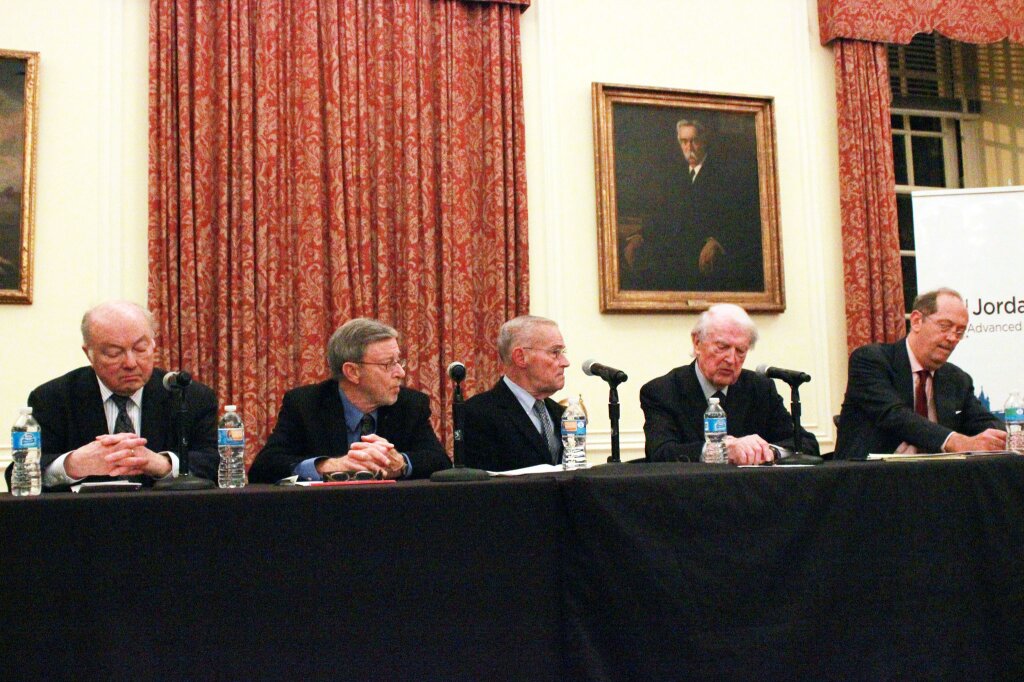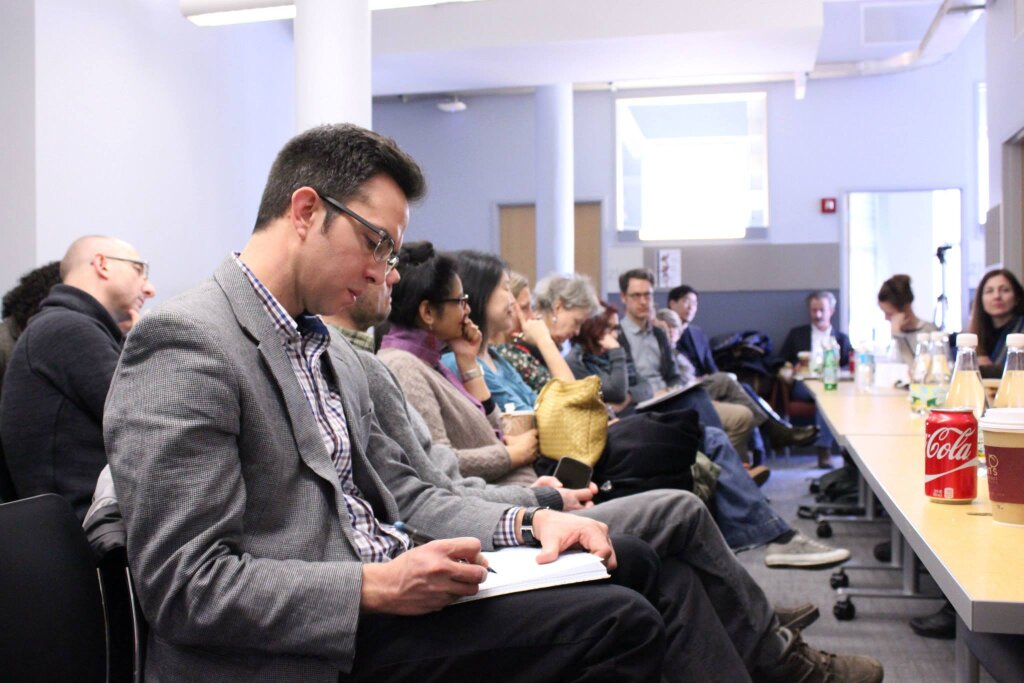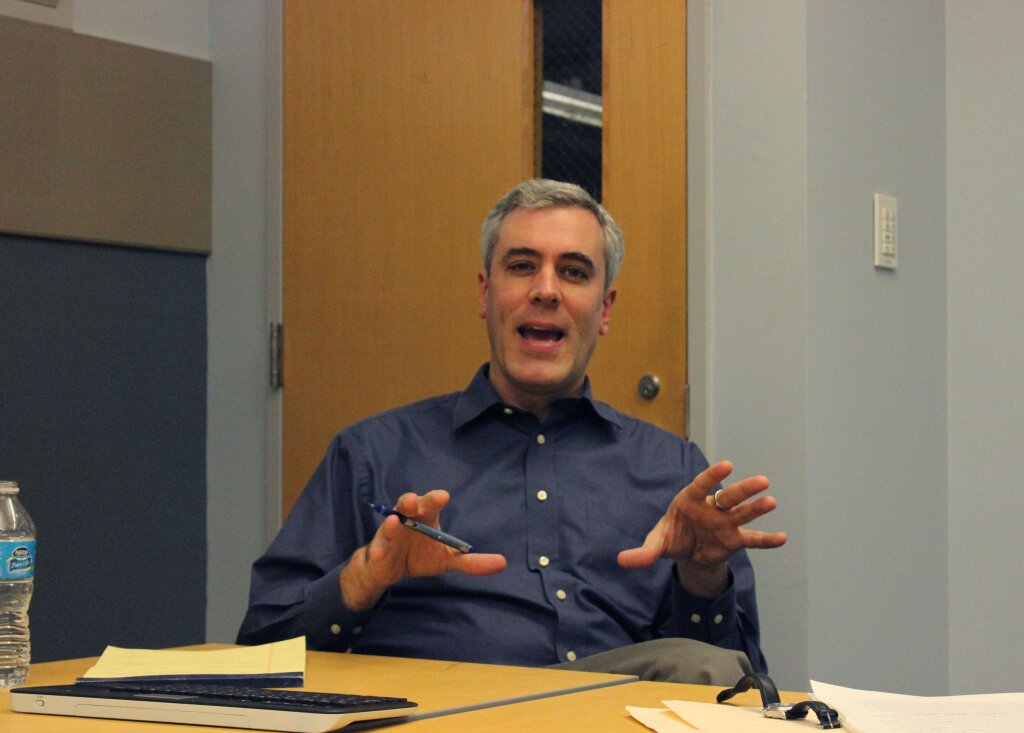On November 23, 2015, the NYU Jordan Center for the Advanced Study of Russia, in collaboration with the Carnegie Council for Ethics in International Affairs, hosted a panel discussion organized by the recently established American Committee for East-West Accord. The event, titled “U.S.-Russian Conflict From Ukraine to Syria: Did U.S. Policy Contribute to It?” featured presentations by five of the committee’s founding members: Bill Bradley, a 1964 Olympic Gold Medalist in basketball and former U.S. senator; Stephen F. Cohen, Professor Emeritus of Russian Studies, History and Politics at New York University; Jack F. Matlock, Jr., U.S. ambassador to the Soviet Union from 1987 to 1991; John Pepper, former Chairman and CEO of Procter & Gamble; and William J. vanden Heuvel, American ambassador to the United Nations under U.S. President Jimmy Carter.
The event focused on the shared responsibility held by Russia and the United States for the current state of their bilateral relations and the necessity for maintaining dialogue and cooperation between the two parties. “Obviously it has been a sore point for many people” Jordan Center Director and moderator for the evening Yanni Kotsonis said in his introduction. “It’s well recognized that relations have deteriorated in recent years.” Kotsonis praised the speakers for their knowledge and experience in the field and stressed the importance of having an open exchange. Kotsonis made clear that the sponsoring institutions were offering a forum, as they did to all intelligent points of view in the current debate over Russia. “The more we can have the public debate with sincerity and with openness, the better off we all are” he said. The discussion also offered the speakers the opportunity to elaborate on the goals of the American Committee for East-West Accord. “We are nonprofit but above all we are nonpartisan,” Cohen said. He explained that the organization was established with the intent of encouraging discussion and debate in the U.S. at a time when the United States has started drifting into a new Cold War with Russia.
Cohen proceeded to shed light on his perspective on U.S.-Russian relations. He highlighted his belief in the connection between American national security and the Kremlin, explaining that it is impossible to deal with the threats of the world without a partnership with Russia. Cohen explained that the most urgent among those threats is “the unholy combination of a new kind of international terrorism” and “the possibility that these murderous zealots may get what they are looking for—nuclear, chemical, biological materials of mass destruction.” He also noted that a durable partnership between Russia and the United States became a concrete possibility during the presidential administrations of Ronald Reagan and George H. W. Bush, but that chance was lost in the following years. “It was lost so badly that we are now in my judgment in a new cold war with Russia,” he said.
According to Cohen, the new Cold War could be more dangerous than the previous one, primarily because of the lack of “rules of restraints” that were in place during the Soviet era. He also warned that the lack of a “pro-detente” opposition to the Cold War in the United States could have a negative impact on the relations with Russia. Cohen blamed the American political and media establishment for attributing full blame for the increase in tension to Russian President Vladimir Putin. “But in my judgment it’s not true. There is plenty of blame to go around for the situation in which we find ourselves today,” he said. Cohen illustrated this by discussing the winner-take-all approach adopted by the United States under the leadership of Bill Clinton, George W. Bush and Barack Obama. In particular, he listed the decision to move NATO closer to Russia’s borders, the refusal to re-negotiate missile defense and to limit American meddling in Russia’s internal affairs under the banner of democracy promotion, and the “repeated broken promises” made to Soviet and Russian leaders in recent history as representative of this policy. Cohen invited the audience to consider the Russian perspective in international relations and asked whether there might be reason to discuss the legitimacy of a Russian national interest abroad. “Is it really possible that the story of American-Russian relations for the last 25 years has only one side of the story, the American side?” he asked. In his concluding remarks, Cohen said that, even though the opportunity for a partnership between Russia and the United States are fading fast, the two countries still have the chance to collaborate in Ukraine and Syria.
Matlock pointed out that one of the major mistakes made by the West at the end of the Soviet era was to quickly assume that it had won the Cold War in “something similar to a military victory.” “That’s not the case: we negotiated an end to the cold war,” Matlock said. “We negotiated an end in the interest of both sides, and in fact of everyone. There were no losers, there were only winners.” He also agreed with Cohen in highlighting the responsibilities held by the United States in spoiling the relations with Russia. Matlock described how the NATO expansion to Eastern Europe represented the violation of a promise made by Bush to then-Soviet leader Mikhail Gorbachev. “Most difficult for the Russians was that the Bush administration renounced the ABM treaty,” he added. He explained that Putin had proposed to amend the treaty, but “we wanted our hands untied, and we walked out.” The treaty, signed in 1972 by Richard Nixon and Leonid Brezhnev, was particularly important in laying the foundation of negotiations on reducing nuclear weapons. Under Putin, Matlock argued, the situation worsened because “in the eyes of Russia we started fomenting revolutions in some of the former Soviet states.”
While Matlock doesn’t believe that the United States funded the revolution in Ukraine and Georgia, he maintained that the American leadership dealt with the situation improperly. Russia was also responsible for the current situation. “While we were making what I think were errors, the Russians were making worse errors,” he said. “The reaction was often an overreaction, they often interpreted things that were not meant to be harmful to Russia as directed at them and they have developed a full, you might say, narrative that the U.S. brought the Soviet Union down by trickery and is out to encircle Russia and to turn it into a quasi colony.” Yet Matlock insisted on the importance of collaborating with Russia to face global threats. “Russia is going to be either part of the problem, or part of the solution,” he said.
Pepper took to the stage stating that he is “very worried about the future of our country” and urged Russia and the United States to identify their common interest. In order to do so, he claimed, it’s important that we learn to see the world through other people’s eyes. “We have a hard time in doing that as human beings generally and we have a hard time in doing it as countries,” he said. Pepper shared his memories from his experience working in Russia with Procter & Gamble. The company entered the Russian market in the 1990’s and continued to grow as a business until the recent ruble devaluation. He noted how Russians and Americans have a shared interest in peace and a common hope for the future, and stated that despite some “nuisance factors” Russia remains a good place to do business in. Pepper concluded by re-asserting the importance of cooperation between Russia and the United States in confronting terrorism and nuclear proliferation.
Vanden Heuvel began by reminding the audience of the many traumatic experiences Russia faced in the 20th century. “Two colossal world wars, every village, city trampled on, every family in Russia touched by the devastation of the war,” he said. “It’s something so vibrant, so alive yet in the Russian memory.” He then commented on the lack of interest in a constructive relationship with Russia that seems pervasive in the United States, contrasting it with the spirit of cooperation that existed during the Soviet era on the matter of nuclear weapons control. The former ambassador also explained how American views on the Ukrainian crisis are often dominated by misconceptions and that Ukraine is a bitterly divided country, with a population split between “Russians and people who hate Russia.” Vanden Heuvel added that the West and Russia should be working together to hold Ukraine together and to help it grow as a country. Speaking on the current situation in Syria, he said that the integration of Russia in a grand coalition is necessary to achieve any durable success in the fight against terrorism. Finally, Russia’s nuclear arsenal and position within the UN Security Council make it essential in guaranteeing global order. “If we work together we can accomplish almost anything, but if we are at loggerheads and enemies the United Nations essentially doesn’t work,” he said.
Bradley began his talk by sharing some memories from his first trip to the Soviet Union, as a student of Oxford University in 1966. “There are many stories that stay with me from that,” he said, reminiscing on his camping trips and run-ins with Soviet authorities, as well as the gratitude displayed by Russians towards the United States for Land Lease. He also recalled how he later ran a taskforce for the Intelligence Committee on Russia while in Senate, travelling frequently to Russia between 1985 and 1991. At the time he saw student exchange programs as an opportunity to improve relations between the two countries, which became possible after Congress passed the Freedom Exchange Act in 1992 (cancelled by Putin in 2004). “It was a two way street. They learned about American but they taught Americans about Russia, Ukraine, Kazakhstan,” he said.
By zooming in on the problems that affected U.S.-Russian relations since the collapse of the Soviet Union, Bradley asserted that the American leadership failed to identify the tremendous impact that the shock therapy economy policy had on the average Russian. He also pointed out how the insistence on treating the war in Chechnya as an issue of separatism rather than terrorism exacerbated tensions between the two countries. Finally, he noted the dismissive attitude often displayed by the American leadership towards Russia. “Where is the respect? Where is the acknowledgement of the size, the resources, the quality of mind of people?” he asked. Moving to the current situation, Bradley condemned the Russian invasion of Ukraine as inexcusable and reminded the audience of the extremely high levels of anti-Americanism currently registered among the Russian population. The senator concluded with an optimistic remark, remembering the accomplishments of the reset policy under Obama and pointing at possible areas for cooperation. “There is an answer in Ukraine. We can find common ground on terrorism,” he said. “The question is: Will we have the discipline and the will to do so?”
The debate was opened to the public in the ensuing Q&A session. One member of the audience concentrated on the importance of introducing diversity to any discussion on U.S.-Russian relations hoping to be relevant and fruitful. In particular, he pointed out that the concerns and histories of countries like Ukraine, Belarus and the Baltic states should be kept into account. Other questions allowed the speakers to share their thoughts on the Russian military presence abroad, the likelihood of a nuclear conflict in today’s world, the role of psychology in explaining foreign policy and the involvement of Russia in Ukraine.



